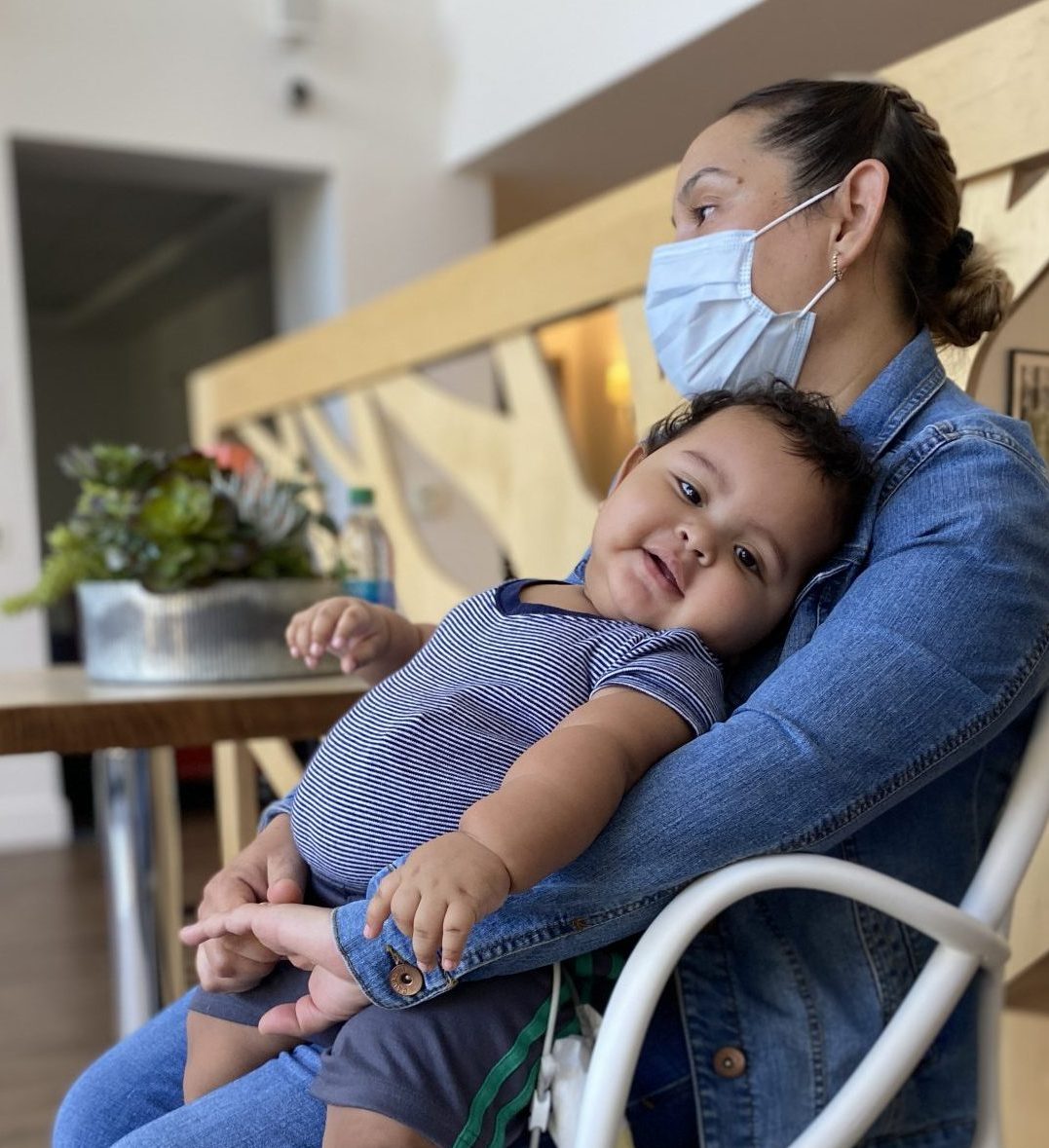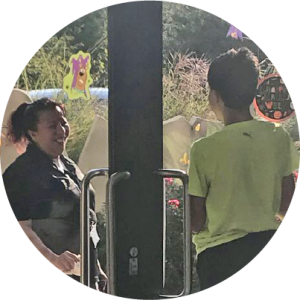When you have a sick child, the world stops overnight. When a global pandemic hits, all certainty disappears. When this community and our frontline heroes come together, we can ensure no family has to face crisis on top of crisis alone.

More than 2,300 people and organizations like you supported RMHC Bay Area’s COVID-19 relief efforts in 2020. Together, we changed everything about the way we operate, closed a $1.4 million revenue gap caused by COVID-related event cancellations and volunteer restrictions, and continued to house and feed thousands of families like Emilio’s whose lifesaving treatments could not wait for the pandemic to subside.
< Maricela comforts her son Emilio, as he recovers from liver transplant surgery at the House.
“You never think this could happen,” said Maricela, whose youngest son Emilio was born with a rare genetic disorder. Without a liver transplant—the kind of care unavailable to Emilio’s family in the Central Valley — Emilio’s own proteins were toxic and deadly.
In many ways, COVID-19 has given us all a front row seat to what Ronald McDonald House families have always known — in the chaos of medical crisis, when fear and uncertainty cloud every choice, when grief is looming, and all sense of normal is gone — it’s the little things that matter.
For three years, Ana Henríquez has worked behind the scenes at Ronald McDonald House as a professional housekeeper, ensuring that surfaces are disinfected according to hospital-advised guidelines, kitchens are sanitized for daily meals, guest rooms are clean and ready at a moment’s notice, and common spaces are safe for medically fragile children. For the 30 percent of Ronald McDonald House families who speak only Spanish, Ana is more than a cleaning professional — she’s a familiar face, a common language, and a comforting presence at a time when language and cultural barriers can make accessing medical treatments even more daunting.
“She is truly a hero.”—Ethan’s mom, Debbie

^ Debbie snapped a photo of Ana making her son Ethan laugh as she washed windows.
“Giving them positive words and courage to continue… it’s really important to give these gestures of goodness,” said Ana, whose warmth and small acts of kindness transcend language. “She deserves high praises,” said Debbie, who travels every few months from Reno, Nevada to the Ronald McDonald House for her son Ethan’s medical treatments. He’s 16 years old with several complex childhood illnesses, including nonverbal autism and a chromosomal abnormality. Debbie says her son doesn’t speak and functions at 4-year-old level, so traveling to the Bay Area for treatments can be especially stressful.
“She made (Ethan) so happy when she was washing windows,” Debbie said in a private Facebook message. “She is such an amazing person. Please tell her thanks for her simple act of kindness.”
“Seeing (Ethan) that day, I was grateful for the reminder of when I used to work with children with special needs,” said Ana, who worked at Hogar Padre Vito Guarato, a nonprofit in her home country of El Salvador that provides a home for abandoned children with disabilities. “As human beings, we have the ability to help children and families who need help. For me it’s easy to take a moment and say ‘Hey, have a cup of coffee, drink some water,’ before they leave for the hospital because I know they have a long day ahead. It’s our job to work, and their job to take care of their children so they can survive their illnesses — and it’s not easy.”
As a mother, Ana knows that — more often than not — it is moms who bear the weight of caring for their sick children. It’s why, she says, she’s able to connect so strongly to the struggle of the moms she meets during her shifts.
 “Us women, we are luchadoras (strong women). We fight to live, for our children, for our families, for those we’ve left behind,” Ana said. “I think that these mothers who have sick children, they feel determined to get them well because their children are what they love most.”
“Us women, we are luchadoras (strong women). We fight to live, for our children, for our families, for those we’ve left behind,” Ana said. “I think that these mothers who have sick children, they feel determined to get them well because their children are what they love most.”
As many nonprofits struggle to survive the economic and operational impact of COVID-19, RMHC Bay Area’s community of supporters ensured that frontline workers like Ana had the resources to keep their jobs and stay safe while protecting families with sick children. In total, we invested $95,000 in hazard pay and other accommodations for our frontline heroes in 2020. Because of donors like you, RMHC Bay Area provided 21,000 nights of housing and 73,000 meals, offsetting nearly $10.9 million-worth of services for families whose children could not wait to access lifesaving care.
“If each one of us puts in a grain of sand, we can gather a lot of it — we can help the families,” said Ana, who has taken all the evolving public health guidance and stringent protocols in stride — increased cleanings, new protective gear, daily temperature and health checks, strict social distancing, visitor restrictions, and quarantine measures to mitigate risk to patients and families.
“I miss seeing the families,” she said. Though COVID-19 precautions have kept the House quieter, and families’ interactions more distant, Ana still feels fortunate to play what she considers a small role in helping ease their burden. But, for families like Evan’s and Emilio’s, her role is anything but small.
“She truly is a hero,” Debbie said. Thank you for being a hero, as well.
“… it’s really important to give these gestures of goodness.” — Ana Henríquez, professional housekeeper & hero to families

Special COVID-19 Relief Report
When you have a sick child, the world stops overnight. When a global pandemic hits, all certainty disappears. When this community and our frontline heroes come together, we can ensure no family has to face crisis on top of crisis alone.

^ Maricela comforts her son Emilio, as he recovers from liver transplant surgery at the House.
More than 2,300 people and organizations like you supported RMHC Bay Area’s COVID-19 relief efforts in 2020. Together, we changed everything about the way we operate, closed a $1.4 million revenue gap caused by COVID-related event cancellations and volunteer restrictions, and continued to house and feed thousands of families like Emilio’s whose lifesaving treatments could not wait for the pandemic to subside.
“You never think this could happen,” said Maricela, whose youngest son Emilio was born with a rare genetic disorder. Without a liver transplant—the kind of care unavailable to Emilio’s family in the Central Valley — Emilio’s own proteins were toxic and deadly.
In many ways, COVID-19 has given us all a front row seat to what Ronald McDonald House families have always known — in the chaos of medical crisis, when fear and uncertainty cloud every choice, when grief is looming, and all sense of normal is gone — it’s the little things that matter.
For three years, Ana Henríquez has worked behind the scenes at Ronald McDonald House as a professional housekeeper, ensuring that surfaces are disinfected according to hospital-advised guidelines, kitchens are sanitized for daily meals, guest rooms are clean and ready at a moment’s notice, and common spaces are safe for medically fragile children. For the 30 percent of Ronald McDonald House families who speak only Spanish, Ana is more than a cleaning professional — she’s a familiar face, a common language, and a comforting presence at a time when language and cultural barriers can make accessing medical treatments even more daunting.
“She is truly a hero.”—Ethan’s mom, Debbie

^ Debbie snapped a photo of Ana making her son Ethan laugh as she washed windows.
“Giving them positive words and courage to continue… it’s really important to give these gestures of goodness,” said Ana, whose warmth and small acts of kindness transcend language. “She deserves high praises,” said Debbie, who travels every few months from Reno, Nevada to the Ronald McDonald House for her son Ethan’s medical treatments. He’s 16 years old with several complex childhood illnesses, including nonverbal autism and a chromosomal abnormality. Debbie says her son doesn’t speak and functions at 4-year-old level, so traveling to the Bay Area for treatments can be especially stressful.
“She made (Ethan) so happy when she was washing windows,” Debbie said in a private Facebook message. “She is such an amazing person. Please tell her thanks for her simple act of kindness.”
“Seeing (Ethan) that day, I was grateful for the reminder of when I used to work with children with special needs,” said Ana, who worked at Hogar Padre Vito Guarato, a nonprofit in her home country of El Salvador that provides a home for abandoned children with disabilities. “As human beings, we have the ability to help children and families who need help. For me it’s easy to take a moment and say ‘Hey, have a cup of coffee, drink some water,’ before they leave for the hospital because I know they have a long day ahead. It’s our job to work, and their job to take care of their children so they can survive their illnesses — and it’s not easy.”
As a mother, Ana knows that — more often than not — it is moms who bear the weight of caring for their sick children. It’s why, she says, she’s able to connect so strongly to the struggle of the moms she meets during her shifts.
 “Us women, we are luchadoras (strong women). We fight to live, for our children, for our families, for those we’ve left behind,” Ana said. “I think that these mothers who have sick children, they feel determined to get them well because their children are what they love most.”
“Us women, we are luchadoras (strong women). We fight to live, for our children, for our families, for those we’ve left behind,” Ana said. “I think that these mothers who have sick children, they feel determined to get them well because their children are what they love most.”
As many nonprofits struggle to survive the economic and operational impact of COVID-19, RMHC Bay Area’s community of supporters ensured that frontline workers like Ana had the resources to keep their jobs and stay safe while protecting families with sick children. In total, we invested $95,000 in hazard pay and other accommodations for our frontline heroes in 2020. Because of donors like you, RMHC Bay Area provided 21,000 nights of housing and 73,000 meals, offsetting nearly $10.9 million-worth of services for families whose children could not wait to access lifesaving care.
“If each one of us puts in a grain of sand, we can gather a lot of it — we can help the families,” said Ana, who has taken all the evolving public health guidance and stringent protocols in stride — increased cleanings, new protective gear, daily temperature and health checks, strict social distancing, visitor restrictions, and quarantine measures to mitigate risk to patients and families.
“I miss seeing the families,” she said. Though COVID-19 precautions have kept the House quieter, and families’ interactions more distant, Ana still feels fortunate to play what she considers a small role in helping ease their burden. But, for families like Evan’s and Emilio’s, her role is anything but small.
“She truly is a hero,” Debbie said. Thank you for being a hero, as well.
“… it’s really important to give these gestures of goodness.” — Ana Henríquez, professional housekeeper & hero to families



